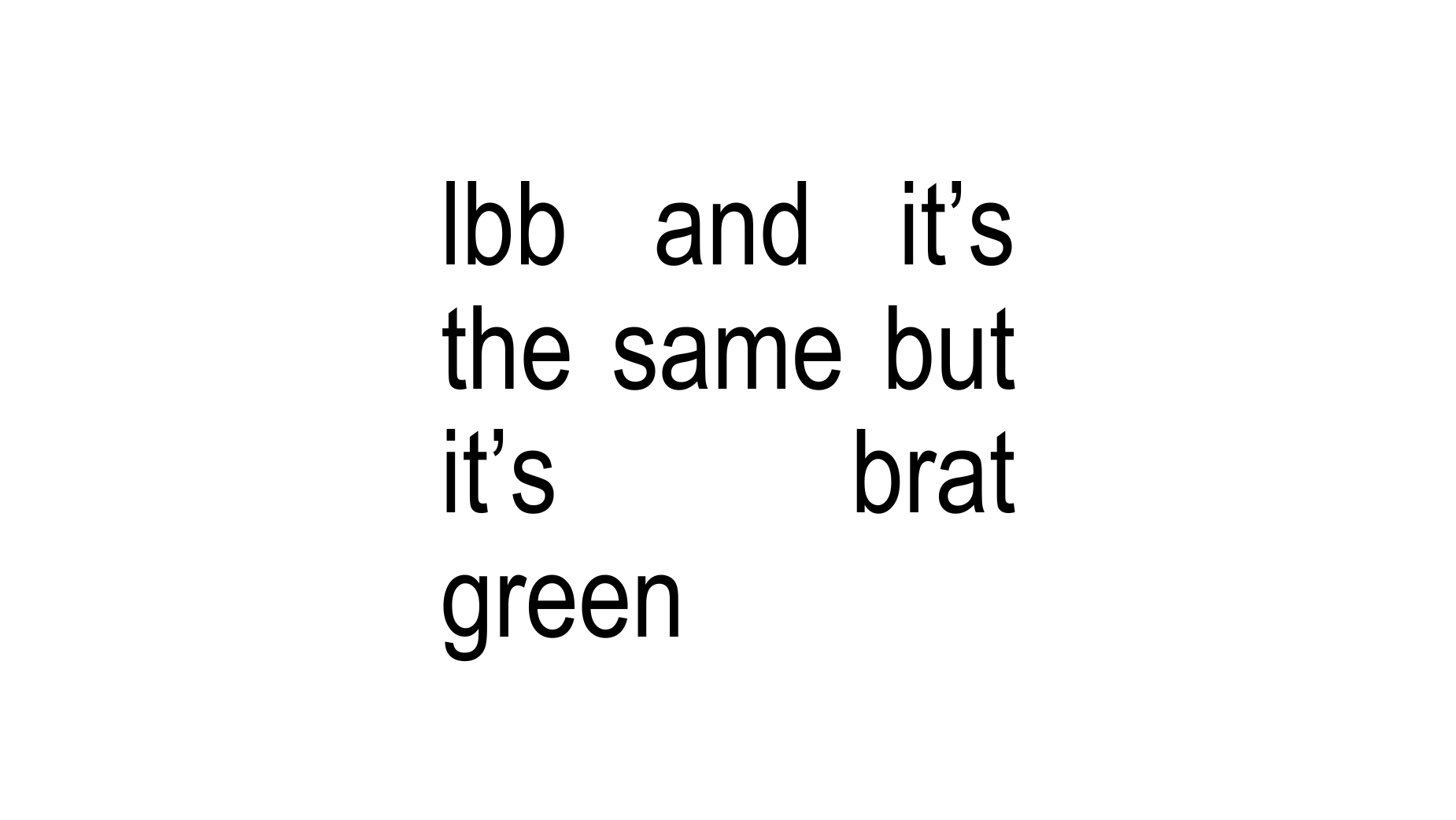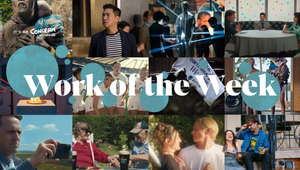
Pop Music Is ‘brat’ and Bigger Than Ever, and Here’s Why

From the drag-inspired synth-pop stylings of Chappell Roan, to the bubble-gum pop of Bardot-incarnate Sabrina Carpenter – pop music is experiencing a huge resurgence right now, with women leading the charge.
At the time of writing, Billie Eilish’s ‘Birds Of A Feather’ just reclaimed the number one spot on the Spotify global chart with 8.6 million streams, while Taylor Swift’s ‘The Tortured Poets Department’ remains the number one album of the year following 13 weeks at the top. And then there’s ‘brat’, Charli xcx’s summer hit record, which has become such a cultural phenomenon it’s even influencing the US presidential election.
So, how does the explosive growth of powerful pop artistry, led by female artists, reflect broader cultural shifts? And how is it impacting the creative industry at large?
The Dawning of a New Era of Pop
Not too long ago, music for teenage girls was being written by male record label execs and assigned to younger male talent. That is no longer the case, as a surge of incredibly talented women, who have autonomy over their own music and the marketing of it, storm the charts.
Take ‘brat’, for example, the global sensation currently serving as the soundtrack for a femme-forward movement of not giving a f*ck. Led by experimental pop singer songwriter and “leader of the cult of alt girls”, Charli xcx, the virality of ‘brat’ demonstrates how modern female artists are challenging gender stereotypes and creating their own narrative. Could this explosive growth of the current wave of pop music be an indication of where the industry is headed in 2024?
When I broach the subject of shifting gender dynamics within music to Carol Dunn, a music industry vet and the managing director at Barking Owl, she shares her hot take. “I have a theory that women moving further to the forefront of this industry started back in 2018, with Recording Academy president and CEO Neil Portnow’s sexist comment made during that year's Grammys,” she says. “He said that women needed to "step up" if they wanted to be represented in the music industry. That ignorant comment further fuelled the fire of lady musicians, producers and engineers to speak out."
“In 2021, two organisations were born to uplift and further the mission of female empowerment and inclusion in all music fields - We Are Moving The Needle and The Music Academy's 'Women in the Mix'. The latter was launched to address the issue of diversity, with a 'Women in the Mix' pledge which asked chart-topping artists to consider at least two women when hiring an engineer or producer. These micro steps have given women the extra hand needed to gain further success.”
A lot has certainly changed since 2018. At the 2024 Grammys there was a total gender inversion, with only one man appearing as a nominee in the three major categories – for Record, Song and Album of the Year.
While counter-cultural female pop music has always existed, according to Carol’s theory, this influx of successful female artists with their own uncompromising views on music - who are writing and producing their own music - has been a long time coming.
Like Carol, Martin Gutierrez, creative director of sync at SoStereo, also believes this gender shift signifies a remarkable evolution that has been years in the making. “Artists like Madonna, Nina Simone, Celia Cruz and Lady Gaga are precise examples of pop stars that have reshaped the music industry in the past. They too didn’t care about being the archetype that I mentioned before. Their music and their personas were unapologetic, real and transcendental,” he points out.
“Right now, the rise to stardom of Chappell Roan is one particular case that I find very fascinating. Known to her fans as the 'Femininomenon' the queerness of Chappell’s persona and her one-of-a-kind lyrics resonates with a big audience. She uses theatricality, costumes and campiness to highlight her already extraordinary music. Cases like hers feel refreshing; it opens a panorama for new and exciting artists that can bring along music that challenges the norms.”
Martin tells me how this change is not mutually exclusive to younger generations like gen Z, either. “As a millennial, I too feel the old formula is no longer working. Instead, I’m always on the lookout for true voices. It is essential for the music industry as a whole to amplify voices that are sharing their perspectives, feelings and experiences in this world. The typical archetype of a female pop star established by society was never 100% realistic, because it was created by someone else. Women asserting their independence and voice is no longer a trend, it is a fact, and female entertainers are now becoming cultural icons who embody these values.”
Accessibility to Artistry
When I speak to Heather Gardner, head of music supervision at Toronto’s Vapor Music, she suggests that the growth of largely accessible music creation and distribution over the last 10 years is a key contributor to this new wave of autonomous pop stars. “Even in the early 2000s, creating and releasing music was solely at the mercy of record labels, who determined trends and artists to match,” she points out. “So even when we had pop-leaning music trends - the Britney, Christina, *NSYNC, Backstreet Boys era - there wasn’t necessarily that counter-cultural counterpoint at the same level of visibility, because pop music was expensive to record and in particular, market.
“The barriers to entry into the playing field have now been significantly reduced, with music creation software coming standard on iPhones to digital releases costing mere dollars to do independently. The opportunity is there for music to be created without having to jump through the hoops and expectations set by others in a previously narrow definition of success, ultimately giving so much more opportunity for difference to be celebrated. That then trickles upwards and you see the majors embracing unique voices as well, which is phenomenal.”
He cites the ascension of Billie Eilish as a testament to the power of digital media in launching the careers of young artists. "Billie was able to hone her own unique sonic POV using her low-cost bedroom studio setup, self-distributing her music via SoundCloud. By the time major labels took notice, she already had established a strong artistic POV and growing fanbase. This process ultimately shifts creative power away from the major labels and back onto the creators themselves, emboldening more diverse and adventurous artistic choices. For female creators and fans of killer music, this is a win-win."
Kristoffer Roggemann, creative producer and partner of Mophonics, also brings up the subject of increased access to cheaper and more powerful music production and distribution tools. I ask him about this democratisation of music creation and he explains that it has caused the music industry's barriers to entry to gradually fall off and how, most recently, this has escalated at an unprecedented pace.
"Previously, solo female artists had to navigate the major label system dominated by mostly-male corporate heads, A&R’s and record producers, from which very few were able to create and release music on their own terms (Joni Mitchell comes to mind.) In today’s landscape, many artists are able to develop and craft their sound independently of meddling industry forces that often seek to standardise music into a 'radio-friendly’ aesthetic."
He cites the ascension of Billie Eilish as a testament to the power of digital media in launching the careers of young artists. "Billie was able to hone her own unique sonic POV using her low-cost bedroom studio setup, self-distributing her music via SoundCloud. By the time major labels took notice, she already had established a strong artistic POV and growing fanbase. This process ultimately shifts creative power away from the major labels and back onto the creators themselves, emboldening more diverse and adventurous artistic choices. For female creators and fans of killer music, this is a win-win."
Kickstarting Change for Good
In addition to the rapidly evolving digital landscape and accessibility to creative outlets, the undeniable changes to societal expectations has made way for a reshaping of industry norms and audience appetites. “Music is absolutely a reflection of current society,” Heather highlights, “So when we are encouraging youth to be true to themselves, musicians are going to grow up with the freedom of not having to hide or pretend, which is absolutely reflected in the music that is created.”
What we are seeing more of, as a result, is a new brand of femininity. Freedom to express, celebrate and empower women in diverse and exciting ways has become strongly associated with this new pop music. And while women have long been undervalued for their craft in not only the music industry but in every industry, the current state of play appears to promise a more even playing field for all those wishing to take part.
“From a creative or musical viewpoint, I believe we are at a fundamental crossroads,” Carol says. “Women have always led the march of change so, of course we're seeing that shift in pop music. People have found the courage to speak their truth and be their true selves because we only have this one life to live. With that comes the bravery of waving your freak flag - whatever colour that may be - by writing songs of hope and joy and giving us more reasons to dance like nobody's watching.”
Read Part 2: Dissecting the ‘Femininomenon’: What Makes Pop Music Popular in 2024?
Image sources
https://commons.wikimedia.org/wiki/File:Charli_xcx.jpg#filelinks;
https://commons.wikimedia.org/wiki/File:Sabrina_Carpenter_@_Wiltern_10_15_2022_%2852526443913%29_%28cropped%29.jpg;
https://www.flickr.com/photos/142899511@N03/48590442776;
https://commons.m.wikimedia.org/wiki/File:Chappell_Roan_18_%28cropped%29.jpg;
https://www.flickr.com/photos/paolov/53109587454/in/photostream/















